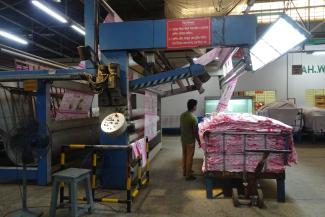Trade policy
More fairness and sustainability

Many people protested against EU plans to conclude free trade agreements with the USA (TTIP) and Canada (CETA). They criticised the non-transparent secret negotiations and argued that the agreements would give too much power to multinational corporations. In their eyes, workers’ interests and the environment were being neglected. The SPD authors endorse that view. Negotiations on the TTIP agreement have been on hold since US President Donald Trump took office. CETA has been in force since 2017.
According to the authors, developing countries are disadvantaged in current trade relations. Poor countries face strong competition. The consequences include low wages and brutal labour conditions. Little value addition takes place in developing countries, as most high-revenue processing is done in richer countries.
For these reasons, the Social Democrats are calling for a reorientation of trade policy. In their opinion, it should be guided by the UN’s 2030 Agenda with the Sustainable Development Goals (SDGs) as well as the Paris Agreement on climate protection. Items on their agenda include the regulation of the financial markets, a reform of agriculture and a corresponding new international-development policy. The authors argue that only those goods should be traded internationally that are produced in socially fair circumstances, compliance with human rights and respect for environmental health.
The Social Democrats see the World Trade Organization (WTO) as the forum for passing global rules as well as the authority for monitoring and enforcement. All countries, whether rich or poor, should have equal rights.
In practice, however, countries do not have equal power. That is one reason why the WTO’s Doha Development Round hardly made progress after being launched in 2011. Its goal was to consider the problems of developing countries. But the EU and USA prioritized bilateral trade negotiations, not least, because it seemed easier to promote their particular interests, such as legal protection of foreign investors, bilaterally.
Objectives for improving world trade
According to the authors, the EU should do more to democratise policymaking in trade affairs. They warn that the Trump-led USA will not play a constructive role in multilateral settings. They want to boost the role of the European Parliament in regard to international trade deals, and they also want to involve national parliaments and civil society.
In the Social Democrats’ view, global trade rules must continue to be shaped in the WTO context, and all bilateral agreements must be WTO-compliant. That means that they may not counteract WTO rules, though they may go beyond them.
The authors’ oppose international tribunals designed to protect foreign investors. Moreover, they insist that labour laws, social-protection systems and environmental legislation must not be considered trade-obstructing in legal terms. In contrast to current WTO-practice, they want ratification of the eight core labour standards of the International Labour Organization (ILO) to be a precondition for multilateral cooperation.
The authors propose reducing Germany’s persistent trade surplus by boosting government spending on things like education and various kinds of infrastructure, including transport, digitalisation and clean energy.
Link
Friedrich-Ebert-Stiftung, 2018: Fair play in world trade – towards a social democratic redesign of trade policy.
http://library.fes.de/pdf-files/iez/15109.pdf














